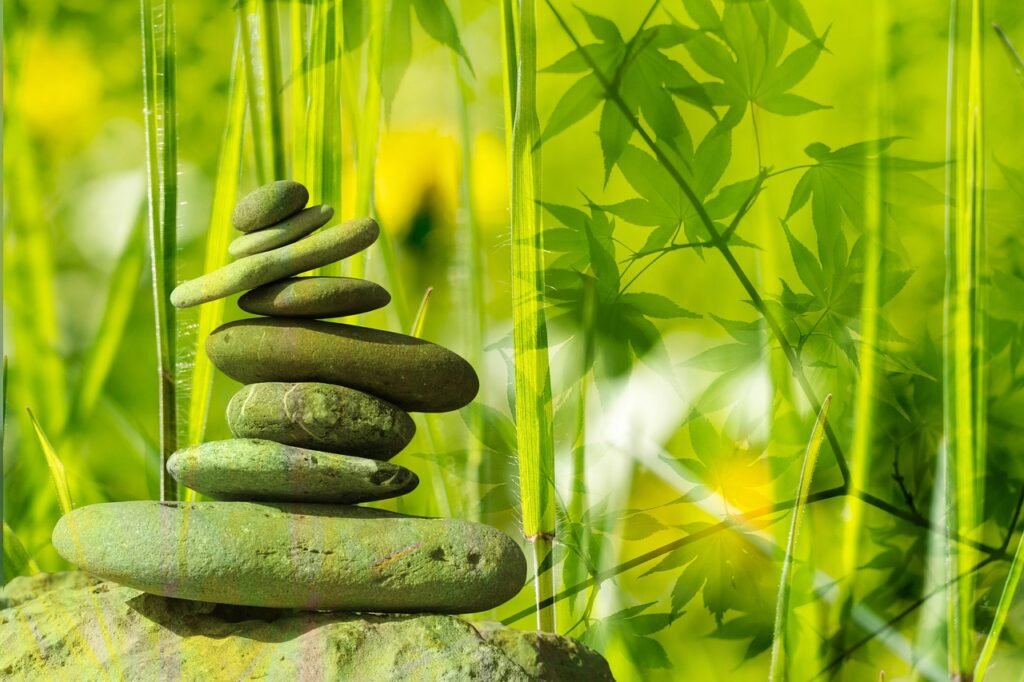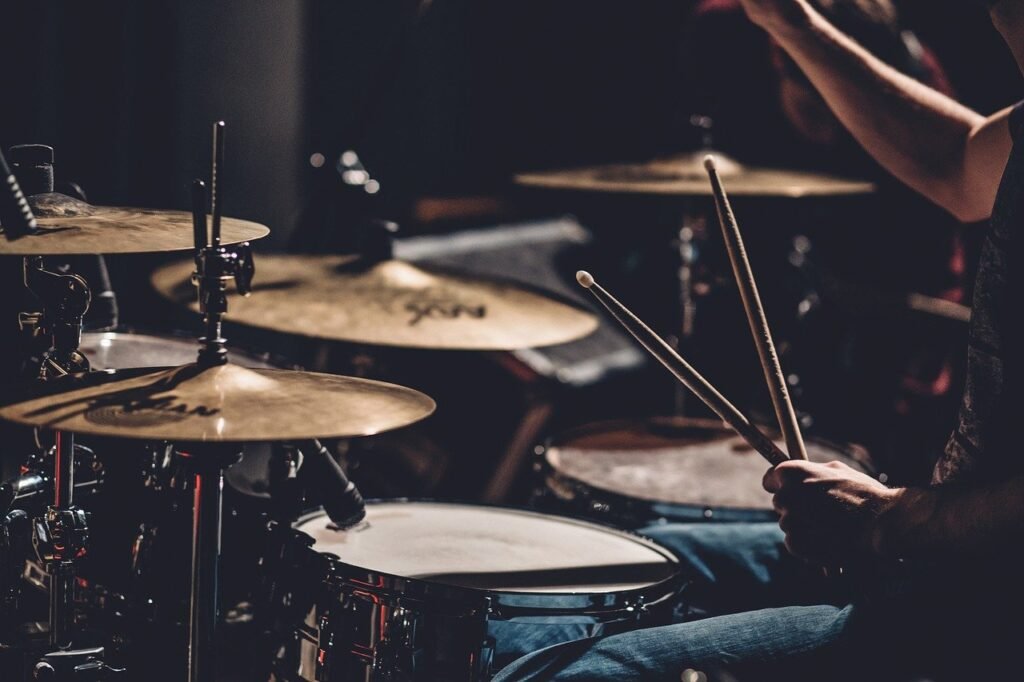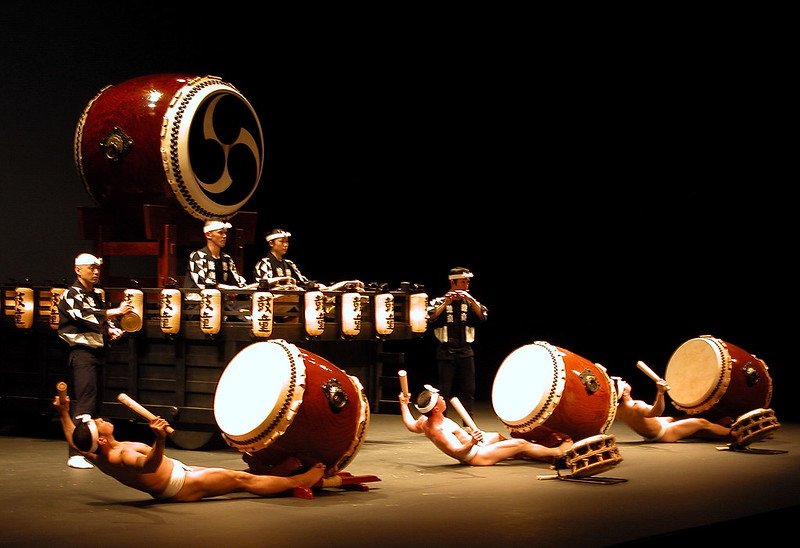About
Read more about the Drum Zen approach to drumming. Scroll down or use the quick links below to navigate.
Drumming as a Meditation
The connection between Zen Buddhism and playing the drums.
Establishing a Musical Orbit
Cultivating consistency towards your practice.
The Principles of Progress
Create a solid foundation for perpetual learning.
How is Zen Meditation Related to Drumming?
Often, when playing the drums, it is when we think about the details of what we are doing that things go wrong. In addition to learning new patterns and rhythms, we must train our minds to suspend thought. We aim to develop our awareness so that we can zoom in and out while playing, focussing on the different elements of our rhythms and the music as a whole.
Our drum practice slowly programs our body with different movements and patterns. When playing and performing, we intuitively choose which pattern serves the music best.
With practice, a drummer can make complicated patterns look effortless. But, as anyone who has ever tried to play can attest, drumming is far from easy.
We might think that thrashing wildly on a drum kit is the furthest thing in the world from the archetypical view of monk sitting calmly cross-legged. Meditation is a state of mind that we can cultivate in many ways. Sitting still and watching our thoughts is one of the most well-known.
It is true that many people experience states akin to meditation doing things they enjoy. As we discovered above, the Sanskrit word for meditation, dhyāna, is a state of complete immersion, an intuitive connection uniting one’s actions, where thought fades away.
Traditionally, it the practice of withdrawing the mind from the impressions served by the senses. In our context, we are training our bodies to intuitively perform on our instrument without thought. We are overcoming our default responses to musical scenarios, expanding our awareness and developing our musicality.
What is Zen?
Zen is defined as, “a state of calm attentiveness in which one’s actions are guided by intuition rather than by conscious effort.” [1]
We sometimes say that people who display calmness and acceptance are very ‘Zen’. It is a state that can be developed through meditation. In truth, no one can be taught Zen. It is a way of operating that must be intuitively felt. It cannot be explained.
In Japanese, the word literally translates as ‘meditation’ and is derived from the Sanskit word dhyāna. Through meditation we find answers that we cannot find alone through ritual and the study of scripture. Zen goes beyond the written word, beyond logic. Meditation seeks to produce direct experience of the things in life that cannot be explained.
Zen Buddhism teaches us to seek mastery in that which we do regularly. Drumming serves as a way to exercise this pursuit of mastery. It is something that you can spend your lifetime perfecting. Always finding something new to work on and develop. Continually returning to the basic foundation
Drumming as a Martial Art
A martial art is taught as a codified system of movements that are practiced individually before being put together into endless different combinations. Combinations are chosen intuitively by the artist to achieve consciously-chosen outcomes.
We may think that martial arts only involve combat and it is true that is where the term originated. Traditionally, martial arts have also been used a way to refine the mind and spirit, as well as the body. Many references to meditation and achieving an ’empty mind’ exist in various training styles.
Drumming is primarily physical and requires a standard of physical ability to be maintained. It also requires development of the emotions and mental resilience to maintain concentration. States achieved while drumming naturally also bring the practice a spiritual element.
I present drumming as a practice. A martial art. Something we engage in for refinement and personal development. A path to find gradual improvement.
We cannot complete drums. Music is not a closed system. It is an infinite game where there are simultaneously very strict rules and no rules at all.
Our practice is a pathway to opening the mind. Getting used to doing things for their own intrinsic value, rather than for some external reward.
We drum for the cleansing effect it has on our consciousness and bodies. We engage with a task that demands deep concentration as a meditation, a way to retreat and rejuvenate so we may bring our best self to the world each day.

To drum Zen is to approach the instrument from a different perspective. So much of what we engage in in the Western world has to have a purpose. We want to see a result, we always need something concrete and tangible.
This is a valuable approach, it gets things done. However, life can start to lack meaning when it becomes a series of tasks that need to be ticked off. We need goals, but we also need dreams. We need to learn how to do, but we also need to learn how to be.
I encourage you to embrace a new way to look at playing a musical instrument. To treat it as an orbit.
Building a Consistent Practice

What is a Musical Orbit?
The trajectory of learning and playing a musical instrument is much more like an orbit than a timeline. A continuum instead of a straight line.
To make progress, all that matters is that we keep showing up. Keep playing. Keep doing the work.
We engage with an orbit at a certain frequency. Perhaps we play two times a week. Perhaps only once. All that matters is that we engage consistently with the activity.
The more frequently we engage with something or someone, the more familiar we become with it or them.
An orbit can be seen as something we engage in frequently without an end in sight. An area where we maintain a standard of activity or responsibility. This is different from a project or mission: something that has a set timeline, clear objectives and an end date.
The analogy of an orbit also supports the essence of non-attachment. We have faith that we do not need to cling too tightly to what we are doing because we trust that it will return to us.
A good comparison is personal fitness. We have goals in our physical fitness (running a certain distance, lifting a certain weight) but we know that these are a means to an end. A way to get the best out of ourselves.
We know we can never ‘complete’ fitness. If we stop working out or engaging in physical activity then our fitness will decline. It is something we engage with frequently because we enjoy the feeling we get from the time we spend doing it.
Playing a musical instrument is exactly the same. We have goals (learning songs, taking exams, performing gigs) but we know that we won’t stop playing after we achieve these things). We play music because we get something from the time we spend doing it.
To build a consistent practice, you have to love playing for its own reward. For the thrill of playing live with others. The satisfaction and euphoria from playing your favourite songs. The relaxation you get from concentrating on something non-essential to physical survival. The connection, devotion and love you ultimately develop towards music.
Music provides a model for understanding how the world works. It provides another way of thinking, one that strays from logic and taps into our inherent nature.
Getting Better, All The Time
Expecting too much too soon. In fact, expectations in general.
It is said that it only takes two things to get good at something
1. Find a teacher
2. Don’t give up
That teacher could be you. It could be the internet. Generally, the more potent the source of expertise, the faster you will progress.
We are not embarking on the journey of becoming a drummer with an end goal in sight. After just one lesson, after a single month of study, you will have moved your body in ways that you will be able to retain for the rest of your life. Like riding a bicycle, you will never forget how to play the drums once you learn.
Finding Balance
Learn When Not To Play
Balance is essential when playing music. We must strike a balance between self-expression and serving the music. We must refine and tame the ego. A good drummer knows when not to play a fill.
The ultimate balance in music is between playing and not playing. The space left between notes is just as important as the notes themselves. To achieve balance, we must recognise that there are the notes we play, the notes we don’t play and our state of self-awareness which controls the balance between the two.

:: The Principles of Progress ::
Let Go Of The Outcome
Consistency is more important than results. Whether we believe our practice session has gone badly or gone well, we must remember that our opinion is entirely subjective.
Whatever the outcome, all that matters is that we keep going. To be free from illusions, one must neither overly chastise or become over-confident. Both states can discourage practice and inhibit progress.

Balance Practice With Performance
Practice is the diligent repetition of exercises and patterns. Slowly teaching the body how to move in certain ways.
Performance is connection with the moment. Zooming out from the individual movements and being present with the music.
We need both of these disciplines in order to improve. Without practice, we do not learn the subtlety and relaxation required to play with complete control. Without performance, we lose sight of why we are playing in the first place and don’t get used to suspending our conscious mind.
Music Is A Language
It is primarily a form of communication and takes on its true form when used in ‘conversation’.
To read more about this analogy, please click here.
To Help Others Relax, You Must Be Relaxed Yourself
One of our primary jobs as a drummer is to give people a beat they can move to. We align our rhythm with the audience’s rhythm and when done right, the audience can’t help but groove to the music.
To do this successfully, to make others relaxed enough to dance, we must be relaxed ourselves. We are communicating our internal state through our playing. A tense drummer produces a tense groove, which makes the audience tense.
To create connection, we aim to be as relaxed as possible while playing. Fast or slow, music sounds smoothest when the musicians are relaxed.
It is true in conversation that states can be contagious. If we wish to calm someone down, just by being relaxed, their state will alter to more closely resemble ours.
Think Longevity
The more we develop our technique, the more important it is to warm up before we play. Just as an athlete stretches before a sporting event, so a drummer must stretch before performing.
Not only will this practice ward off injury, it will also ensure you are playing at the top of your game. A warmup is both physical and mental: preparing the muscles to play and the mind to relax and concentrate.
You Can Only Do So Much In One Session
But you can do as many sessions as you please.
Practicing something over and over in a session can become counter-productive. Your brain needs time to work on it in between sessions. When you return to the exercise, you will often discover it has become easier, simply because you let go for a while.
The kit should never become a place you don’t want to return to. Practice until the practice no longer yields improvement, rest and return the next day.
Throw The Clock In The Bin
As drummers, we herald timing as king. The clock naturally divides time up in a set way. From a tempo point of view, a clock is always playing at 60 bpm or 120 bpm. Not all songs are at these tempos. To become proficient across the full range of tempos, we must experience time at different intervals.
The clock assumes all portions of the day are perceived in the same way, it does not account for when time appears to race or drag.
We must develop our timing to go beyond the clock, and ultimately, beyond the metronome.
This also refers to how long we spend practicing. Earning a skill takes as long as it takes. It may take someone else X amount of time, but it is fruitless to think your path will be identical to another. If we think only in terms of time we can lose sight of what is actually important in our practice.
The Space Between The Notes Is Just As Important As The Notes Themselves
It can be tempting to fill all space with notes, but music needs time to breathe. On the path to developing musicality we discover that not playing is just as important as playing.
Drums are a supporting instrument in many styles. They are not meant to overshadow the other instruments. It can be harder to stay in check when playing the kit because the physical element gives rise to fluctuations in adrenaline. To develop musicality, we must learn to control our impulses and refine our expression.
Practice Until You Can’t Get It Wrong
We may celebrate when we get something right for the first time. But this is just the beginning. To be able to play it in context, to be able to recall it instantaneously, to be able to use it in performance, we must practice it until we can’t get it wrong.
Don’t Let Anyone Tell You “You Can’t Do It”
If someone else has achieved something in life, then you can too. The only path to failure is being unreceptive to the proven method of success. Once you know how to learn, you can apply the method to acquiring any new skills you desire.
We often give up because we expect too much too soon. But our expectations are based entirely upon what others have achieved. Very often, we will only be aware of their successes, with no knowledge of the many times they have failed to get where they are.
Success is entirely dependent on consistency. Find something you enjoy, people to help you and don’t ever stop. That is the absolute formula for success.
Inspiration for the Movement
The Kodo Drummers of Japan
I first heard about the Kodo drumming school on Sado Island in Japan from the Michael Palin documentary, Full Circle.
Michael went to stay with the drummers for a few days and we got a glimpse into their lifestyle. They live and breathe drumming, practicing all day long and living monk-like existences.
This idea of dedicated daily practice and centring one’s life around drumming was a big inspiration on the Drum Zen philosophy and cultivating The Way of the Drum.
